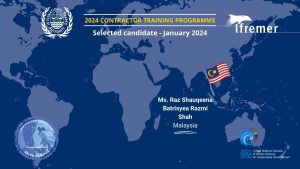Issue Date: 1 November 2023

UPDATE (8 January 2024) The following candidates have been selected:
| Rank | First Name | Last Name | Sex | Country | Country Class. |
| First-ranked Candidate | |||||
| 1 | Raz Shauqeena Batrisyea | Razmi Shah | Female | Malaysia | |
| Reserves or Alternate Candidates | |||||
| R1 | Ignacia | Acevedo Romo | Female | Chile | |
| R2 | Rena | Hernawati | Female | Indonesia | |
Ifremer (French Research Institute for Exploitation of the Sea) in accordance with its exploration contract for polymetallic sulphides with the International Seabed Authority is offering one (1) internship for candidates of developing states. The internship will take place within the deep-sea ecosystems studies laboratory of Ifremer, in Brest, for a duration of two months (approximately from April to May 2024 or earlier if the candidate is available).
Programme Outline:
The internship will focus on the characterization of the fauna (especially meiofauna) colonizing experimental substrata deployed at the peripheries of active vent sites as well as in inactive areas around the TAG and Snake Pit vent fields along the Mid-Atlantic Ridge. This experiment was deployed for four years, with the goal to characterize colonization processes and to provide a perspective on ecosystem restoration through the evaluation of the potential of artificial substrata as a tool promoting organism’s settlement. Substrata have been recovered, and colonizing fauna has to be sorted and identified, before comparison with natural communities established in the vicinity. At the start of the internship, the candidate will receive a short training in meiofauna sorting and identification of major taxa.
The activities of the internship will include:
- Extracting and counting meiofauna individuals from the 20-300 µm fraction of the material collected on substrata (binocular work)
- Sorting individuals into major taxonomic groups (copepods, nematods, halacarids…)
- Imaging and taking morphometric measurements on some macrofaunal taxa previously sorted from the > 300 µm fraction collected on substrata.
Qualification requirements:
- Education: As a minimum requirement, candidates should hold a Bachelor’s degree-level education (preferably in natural sciences) and should be enrolled in a first Master’s level course (or equivalent) in biology, preferably in marine biology, biodiversity and ecology or molecular biosciences. Moreover, it would be appreciated if candidates already had experience in marine biology, biology laboratory work and skills in sorting meiofauna, or at least motivation for careful work under a binocular magnifying glass.
- In addition, candidates must be proficient in either French or English (both written and spoken).
- Candidates should hold a passport with sufficient validity after the planned departure from France to comply with French Visa requirements.
Cost bearing:
Ifremer will cover the following costs:
- International airfares (economy class, return ticket);
- Accommodation, local transports in France if required and meals for the duration of the training.
Other requirements:
The selected candidate will be required to sign a confidentiality agreement with Ifremer. At the end of the training, the trainee will be required to submit a report to Ifremer and ISA outlining the training completed; the benefits of the training opportunity; the knowledge gained; and how the training will advance their career and/or educational pursuits. Trainees will also receive certificates.
How to Apply:
All interested applicants are invited to register through the ISA online portal through which they will submit their applications together with the necessary requested documents including:
- A copy of current passport photo and valid passport biopage
- Signed nomination form [docx | pdf] by the nominating entity
- Copy of degree/certificate
- Copy of CV or Resume
- Proof of sufficient knowledge of English or French
Application Deadline: 3 December 2023.
One of the Voluntary Commitments registered by ISA at the 2017 UN Ocean Conference (#OceanAction 40768) and reiterated in 2022 was ‘Enhancing the role of Women in Marine Scientific Research through Capacity Building’ – As partner of the Women in Deep-Sea Research project (WIDSR), IFREMER has pledged to allocate 50% of the training opportunities to qualified women applicants.
All queries concerning these two training programmes should be directed to training@isa.org.jm

